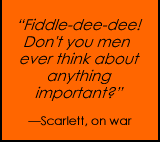"Fiddle-dee-dee! War, war, war. This war talk's spoiling all the fun at every party this spring. I get so bored I could scream. Besides, there isn't going to be any war." These opening lines of Scarlett establish her relationship to the war.  The audience, of course, knows there will be a war, and so Scarlett's attitude seems like self-centered, wishful thinking; even most other characters realize what some Americans later came to see as inevitable, and many of the men are (accurately) portrayed as eager for the conflict to begin. Similarly, Scarlett appears downright silly if not callous when, having just been rejected by Ashley and confronted by Charles Hamilton with news of Lincoln's call for volunteers, she says, "Don't you men ever think about anything important?" (invariably evoking audience laughter).
The audience, of course, knows there will be a war, and so Scarlett's attitude seems like self-centered, wishful thinking; even most other characters realize what some Americans later came to see as inevitable, and many of the men are (accurately) portrayed as eager for the conflict to begin. Similarly, Scarlett appears downright silly if not callous when, having just been rejected by Ashley and confronted by Charles Hamilton with news of Lincoln's call for volunteers, she says, "Don't you men ever think about anything important?" (invariably evoking audience laughter). 
If her words establish clues to Scarlett's character, even more do they introduce other themes. First is the sporadic denial of reality in general, a key to both Scarlett's complex personality and to the tragedy of the larger events. Second is the meaning of war in the totality of Scarlett's (and other women's) experiences and world view. Although rarely recognized by critics or audiences, who tend to concentrate primarily on Scarlett's personality, underlying her ostensible smallness is a larger truth: Marriage, to the man of choice, was an issue more central in women's lives than in men's because more crucial to their survival in a society which dictated economic and social dependence on men.
An acceptably "female" lack of interest in war differs from complete dissociation, however, which is neither masculine nor feminine. Significantly, among the men only Ashley and Rhett join Scarlett in her failure to romanticize the war--and in doing so again send gendered signals. Ashley's attitude becomes a part of his effeminacy and Rhett's attitude becomes part of his overall cynicism and opportunism (also appropriately masculine traits). They both fight, though: While Ashley's military conduct reflects a Lee-like sense of duty to state, Rhett's turnabout may be necessary for completing the message of his ultra-masculinity. At the same time, women could be less enthusiastic than men about battles past and present, but most certainly they were expected to fulfill their female roles on the sidelines, whether as nurses, cheerleaders, or other supporters. In this context, Scarlett's defection is double, as woman and Southerner; although prototypically female in seeing alternate effects of the war, she is neither male nor female in rejecting the war and The Cause entirely. After all, such an outlook was/is a luxury reserved only for the definitive individualist among rabid nationalists, s/he willing to be called a traitor.
The discrepancy between the women's and men's concerns in the story mirrors the now common division of private versus public spheres of influence for certain classes of nineteenth-century women and men. In so doing, the film reinforces ideas that ground feminist scholarship, and these consequently offer a framework for evaluating the critical strategies for interpreting the film. Although a thorough analysis of the critical responses to the film is beyond the scope of this treatment, it is relevant that gendered definitions is one aspect of the persistent reluctance of critics to classify Gone With the Wind as art. It is worth noting, though, that there is a striking parallel between treatment of the movie and of American women in general: idolized but not taken seriously, loved but not necessarily respected.NOTE 20





